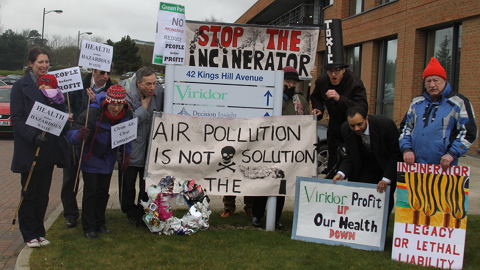Environmental campaigners yesterday protested over plans that would have a new waste incinerator built in Croydon.
Viridor Waste Management offices in West Malling, Kent became a site of protest as ‘Stop the South London Incinerator Campaign’ members played dead on the grounds outside, expressing fears of what the proposed site’s air pollution would mean for the densely populated area around it.
Paul Pickering, chair of the campaign said: “[Viridor’s] solutions are widely regarded as being harmful to human health, and result in falling recycling levels because once the contract is signed the incinerator will need to be fed 300,000 tonnes of waste for the next 25 years.
“Viridor can manage the waste in the four boroughs in a more sustainable way. They could build small scale recycling centres across the four boroughs, thus nullifying the need to build an incinerator and creating ten times more jobs in the process.”
Viridor was awarded a 25 year contract to provide waste services for Croydon, Sutton, Merton and Kingston in November of last year. The company says it will burn 200,000 tonnes per year with incinerator.
A company representative came out to accept a letter from protesters, who carried banners and chanted “air pollution is not the solution” as other Viridor employees looked on from their windows.
A Viridor spokesperson said: “Energy Recovery facilities, such as the one proposed at Beddington, will provide a modern, robust and cost-effective solution to serve local households and businesses in South London. They are safe and proven; a view that is supported by the UK’s Heath Protection Agency.”
Jean Lambert, Green MEP for the London, said: “Incinerators, like the one Viridor is planning to build at Beddington Lane, do not provide a green or responsible waste solution. Incineration technology necessarily requires waste input – and diverts materials which should be sent for recycling.”
A European Environment Agency report in 2011 showed that lost life, poor health, crop damage and other economic losses caused by industrial air pollution cost Europe up to €169bn in previous years.





